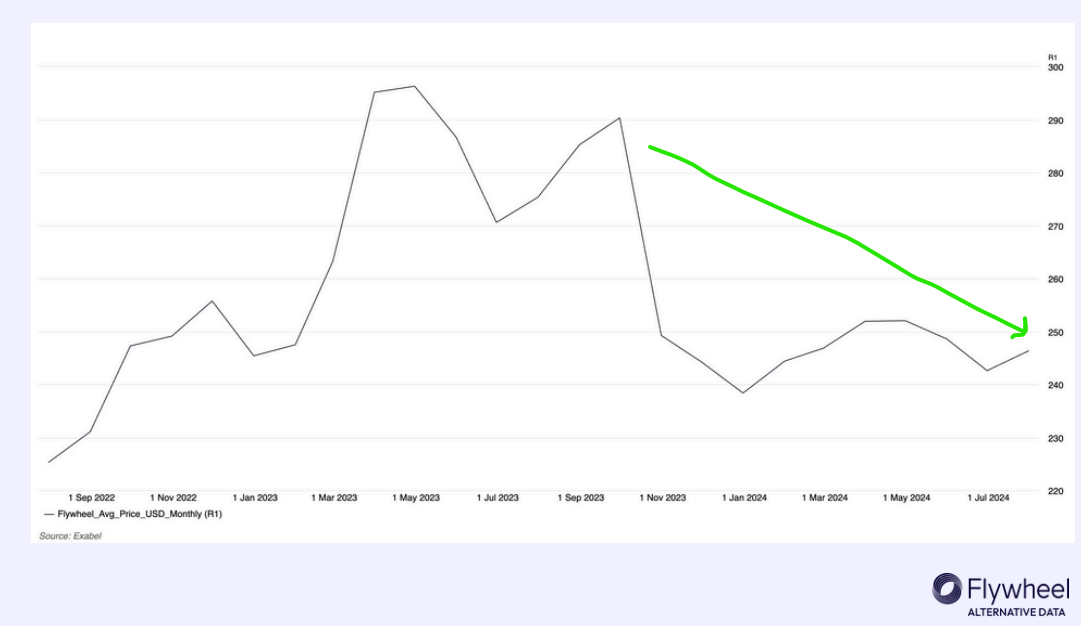
Creator-led Businesses and Virtual Reality’s Hard Reality
Plus: Write a book in 30 days with AI
July 20, 2024 · Updated December 27, 2025
Hello, and happy Sunday! As a prelude to the start of the Summer Olympics in Paris on Friday, Foucault is at the top of the book piles of both Dan (The Archeology of Knowledge) and Evan (Discipline and Punish: The Birth of the Prison). To find out what other light reading is on Evan’s list, scroll down to our top story.—Kate Lee
Was this newsletter forwarded to you? Sign up to get it in your inbox.
Knowledge base
"A New Book of the Startup Bible" by Evan Armstrong/Napkin Math: Ever wished for a business book that wasn't just a bloated blog post? Mike Maples, Jr. and Peter Ziebelman's Pattern Breakers is the rare gem that deserves a spot on your shelf next to classics like The Innovator's Dilemma. It introduces "inflection theory," a fresh take on why some startups change the world while others fizzle out. Spoiler alert: It's not about building a better mousetrap, it's about spotting the next big shift before anyone else. Read this if you want to understand why your brilliant startup idea might actually be terrible (and what to do about it).
🎧 "The Internet Creator's Guide to the Future" by Dan Shipper/AI&I: Want to see the future of internet creation? Steph Smith, a16z Podcast host and prolific creator, takes Dan on a whirlwind tour of AI tools reshaping the online landscape. Using examples like Midjourney-designed visuals and hallucinated websites, they explore how AI narrows the gap between ideas and execution. Read this for a glimpse into the evolving world of internet creativity, complete with knitted frogs, pancake hats, and AI-generated outro songs. 🔏 The transcript of this episode is for paying subscribers.
🔏 "Inside the Pod: AI and the Art of Efficient Creativity" by Rhea Purohit/Chain of Thought: Ever dreamed of writing a bestseller in just 30 days? Seth Stephens-Davidowitz did it—with a little help from his AI friend. The bestselling author reveals how he used ChatGPT to handle the tedious parts of writing, like brainstorming acronyms and creating charts. Read this for practical tips on how to use AI to supercharge your creative process and focus on the parts of your work you actually enjoy.
"What I Got Wrong About VR" by Evan Armstrong/Napkin Math: Remember when we told you that virtual reality was the future? It turns out that we might've jumped the gun. Evan eats some humble pie as he breaks down why Apple's Vision Pro and Meta's Reality Labs aren't living up to the hype. With the devices experiencing lackluster sales and facing scientific hurdles, he explains why VR isn't ready for prime time—and why it might be a blessing in disguise. Read this if you want to understand the cold, hard reality of virtual reality and why your next big screen might not be strapped to your face after all.
"Every's Master Plan" by Dan Shipper/Chain of Thought: You may have noticed that things have been rapidly changing around here. Every has been on quite the rollercoaster, but Dan thinks he now has it figured out. It’s neither a software company nor a media company, but a new thing. Read this for an inside look at how honesty, mental health, and embracing your true passions can lead to explosive business growth.
Fine tuning
Thank goodness the VCs are telling us who to vote for. Don’t worry—we aren’t going to tell you who to vote for in the U.S. presidential election. The key issue is that both candidates have shown a willingness to materially alter U.S. tech policy and, by extension, how the world works. This week Donald Trump made negative comments about Taiwan this week, pushing tech chip stocks down. President Biden’s policy position on crypto was used to justify the Andreessen Horowitz founders’ donation to Trump. Today is not the day when we comment on the viability of these arguments or the impact these policy changes would have on the world, but it is important to point out that they’re happening. The leaders in our industry are donating to make sure they are positioned advantageously (exhibit A: Elon Musk giving Trump $45 million per month until the election), so unfortunately, you need to think about what policies will affect your life and business. Policy analysis is boring to read (and write about), but they matter for builders. As things change, we will keep you informed.
Horniness is no respecter of profit. I’ve long argued that Match Group, owner of Tinder and other dating sites, is one of society's most important companies. Relationships, children, and social cohesion all flow downstream from swiping left or right on a cute pic. But companies that enable better living do not necessarily capture all the value they create. Match has had struggles with growth and monetization for a while, and the sharks are circling. Activist investor Starboard has built a 6.5% stake in the company and is calling for changes. This is one reason for which the “solve problems for customers” framework of startups is wrong—many problems are socially important but economically challenging (see climate change).
Spreadsheet LLM. Oh, thank sweet baby Jesus in the crib—it has finally happened. Microsoft unveiled SpreadSheet LLM, an encoding method that helps LLMs understand spreadsheet data. We are so, so close to automating away the vast majority of spreadsheet work. I cannot personally wait to no longer have to open Excel ever again.
Stripe at $70 billion? Sequoia Capital offered investors a chance to liquidate their positions in Stripe at a…generous valuation. The payments company has shown an extraordinary ability to convince investors that growth lies ahead. My friend on X, pseudonymous equity analyst Mostly Borrowed Ideas, said, “While Adyen raised ~$300 Mn to build a company worth $30 Bn, Stripe raised ~$10 Bn to be allegedly worth $70 Bn. I say allegedly because they both process similar payments volume, but one is barely profitable whereas the other (Adyen) has ~50% EBITDA margin.” Frankly, I don’t know which perspective is right, but Sequoia’s offer is a remarkable turn of events. Still, you can’t ignore the harm delayed IPOs do to the tech ecosystem. In a conversation I had with a growth fund investor managing many hundreds of millions dollars, they told me, “Stripe’s unwillingness to IPO is holding the entire industry back. Stripe holds so much liquidity that LPs are unwilling for investors to keep deploying capital.”
$14.2 billion on Prime Day. Amazon’s sales increased 11 percent year over year for the shopping “holiday.” I noticed that many of its peers (Best Buy, especially) were offering similar levels of discounts. The American consumer stays undefeated in their love of ever more stuff.—Evan Armstrong
Data mining
There's no inflation on the internet. While prices continue to rise (albeit more slowly) in the brick-and-mortar economy, data suggests that e-commerce prices are substantially lower than they were a year before:
Source: Flywheel via Exabel.According to the commerce intelligence company Flywheel, online retail prices are 10.5 percent lower than they were last summer. It’s no accident that Amazon’s Prime Day was a smashing success (or that e-commerce has generally been one of the more resilient categories of consumer spending). As consumers have become increasingly stretched by higher costs (and now slowing income growth), more nimble retailers have been keeping inventory moving with aggressive discounts. It’s a trend that favors e-commerce, which has the advantage of both more dynamic pricing and insulation from the biggest inflationary pressure (i.e., the cost of labor). Temu, Shein, and, more recently, TikTok Shop have grown astronomically not just because China excels at building brain-hacking consumer apps, but because they sell really (really) cheap stuff, and that’s what people can afford. E-commerce is where the discounts are at.—Moses Sternstein
Keyword extraction
Linus Lee, an AI researcher at Notion and a guest on AI & I, curated some links for Every from his newsletter:
What is ChatGPT voice? Three years after the release of DALL-E 2, OpenAI's original text-to-image model, I found myself missing the creativity of its outputs—however crude—compared to modern image generation tools that spit out hyper-detailed, saturated imagery. There was a randomness in its responses that would surprise and (often) delight. Now, the output feels almost too perfect. Is this just an illusion, or have image models lost touch in some small way with reality? Language models face a similar affliction, spitting out bland platitudes and numbered lists in "ChatGPT voice." In a recent article, I explored ChatGPT voice and Midjourney style, how to break free from them, and what it means for AI to truly model the world.
Your environment matters. Here are some additional links for fostering the right environments for creative generative AI work:
🖇 "Principles of Effective Research" by Michael Nielson
🖇 "An Opinionated Guide to ML Research" by John Schulman
🖇 "You and Your Research" by Richard Hamming
I’ve been thinking a lot about the best organizational systems for solving difficult research problems: ambition, community, clarity of vision, and technical taste are all elevated by better tools. It pushed me to think about how to better shape my own enabling environment. Between the lines of these pieces, researchers were focused as much on personal learning and growth as on their research projects, and anchored by specific visions of the impact of their work on the world. I'm planning to check in with myself about how these two factors evolve in my own personal growth and research progress.
Alignment
AI whispers; self-knowledge shouts. In season 3 of The Bear, Jeremy Allen White's character obsesses over his new restaurant's “non-negotiables” like it's the 11th commandment. Chasing a Michelin star, he knows from hard-earned kitchen wisdom that the best restaurants' core values are the holy grail of their success—just like every other successful company in existence. I've been dishing out "know thyself" advice myself, but my own core values are about as clear as a menu printed in italic size 8 font. So when I came across psychologist and writer Dr. Gena Gorlin's essay on using ChatGPT to help define core values for ambitious founders, her advice gave me the push I needed to start using it creatively to uncover my own non-negotiables. ChatGPT responded to my thoughts with probing questions that got to the heart of what I was saying. When I mentioned valuing career success, it pushed me to consider why. Was it for personal satisfaction or external validation? The prompts helped me dig into corners of my mind I hadn't explored before. The end result? A list of non-negotiables in my journal, as clear as anything I've produced. AI wasn't telling me who I am—it was helping me articulate it. It turns out that the secret ingredient to self-discovery was hiding in my pocket.—Ashwin Sharma
Sentiment analysis
Evan’s review of the book Pattern Breakers garnered the most feedback this week, including from its co-author.
“Thanks for taking the time to engage so thoughtfully with the ideas. I agree with a lot of your suggested improvements and next steps as well.”—Mike Maples, Jr.
Want to chat? DM Dan or Evan on X.
Hallucination
What if Apple made a travel MacBook?
Source: X/Lucas Crespo.That’s all for this week! Be sure to follow Every on X at @every and on LinkedIn.
The Only Subscription
You Need to
Stay at the
Edge of AI
The essential toolkit for those shaping the future
"This might be the best value you
can get from an AI subscription."
- Jay S.
Join 100,000+ leaders, builders, and innovators

Email address
Already have an account? Sign in
What is included in a subscription?
Daily insights from AI pioneers + early access to powerful AI tools








.png)

.png)
Comments
Don't have an account? Sign up!